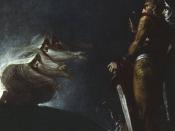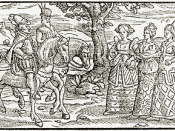Fair is Foul, and Foul is Fair Men have always accused ravishing women of being dangerous, and blame them for all the world's ills. After all, all women are descendants of Eve, the beautiful temptress who caused the fall of man. The Greeks also blame women for the same evil, only they call her Pandora. Even the Chinese are afraid of their women, so much so that they crippled their women for a thousand years. They broke their women's feet in half and fell all over themselves praising these crippled "tottering willows of fascination" with feet like "perfumed lilies" that reeked of death. The name for "woman" in Chinese is xiao ren and nei ren, which means "person for the inside [of the house]" and "inferior man." Obviously, the men are so afraid of women that they need to cage them inside the house and insult them each time they say their name.
Chinese history is full of stories of dangerous women, including one beautiful courtesan who so enchanted the emperor that he set the city on fire just to see her laugh. Similarly, in Shakespeare's Macbeth, Lady Macbeth spurs her husband into killing a king. Yet, she is not the only one who is not what she seems. Thus, in Macbeth, Shakespeare uses the characterization of Lady Macbeth, Macbeth, and the witches to illustrate the fairness of the foul and the foulness of the fair.
Lady Macbeth appears to be a beautiful lady, but in truth, she is a vile murderess. She tells Macbeth that he should look like "the innocent flower, but be the serpent under't" (1.6.75-78). Flowers symbolize beauty, life, and all that is fair, or "of pleasing appearance, especially because of a pure or fresh quality." In reality, she is a serpent, a symbol of the devil and deception. Even her hands are full of foul dirty spots of blood that she cannot wash off: "Out, damned spot! Out, I say!" she cries (5.1.37). Her hands are also "foul" in that they have "an offensive odor": "Here's the smell of the blood still: all the perfumes of Arabia will not sweeten this little hand. Oh, oh, oh!" (5.1.53-55). Lady Macbeth is so full of foul thoughts that she wants to get rid of anything about her that seems fair, which is her femininity: "The raven himself is hoarseâ¦Come you spiritsâ¦unsex me here;/And fill me, from the crown to the toe, top-full/ Of direst cruelty!" (1.5). Lady Macbeth is obsessed with murder and death. She mentions the raven, which is the symbol of death because they are cannibals and scavengers. Ravens rip the skin off fellow ravens that are not like them or are weak and eat them. In England, a tombstone is also called a ravenstone. In order to summon up the courage to kill Duncan, Lady Macbeth feels like she has to be unsexed. She believes that only men have what it takes to slay a king. Lady Macbeth is a malicious woman, who overthrows her husband's morals and convinces him into killing the king.
In the beginning, Macbeth appears to be a dignified hero of Scotland and ironically perceives the day as being as being "unusually foul and fair" (1.3.39). When he comes across the witches, they predicted that he would one day be king. Instead of being delighted, he seems to be alarmed by the news. Banquo did not understand his friend's behavior and inquires, "Good sir, why do you start and seem to fear/things that sound so fair?" (1.3.54-55). Blindly, Banquo and Lady Macbeth misjudge Macbeth for having compassion and loyalty. Banquo entitles Macbeth "good sir," which is a rather deceiving name. And Lady Macbeth sympathetically states about her husband, "Yet do I fear thy nature;/It is too full o' th' milk of human kindness [to do what is necessary to achieve your ambitions]" (1.5.16-17), so in this way he seems fair. In truth, Macbeth murders his best friend, his king, and Macduff's wife and child, and in this sense he is foul. Malcolm mocks Macbeth's cruelty and declares, "Macbeth will seem as pure as snow [if I was king]" (4.3.63-64). Macbeth is mislead by the witches and speculated that he was free of all obstacles when they foretell him the prophecy of unlikely things that have to happen before he will be ruined. The first apparition that is conjured up by the witches warns, "Macbeth! Macbeth! Macbeth! Beware Macduff! /Beware the Thane of Fife! Dismiss me. Enough." (4.1.81-82) The second apparition advises, "Be bloody, bold, and resolute. Laugh to scorn/The power of man, for none of woman born/Shall harm Macbeth" (4.1.90-92). And the third apparition states, "be lion-mettled, proud, and take no care/Who chafes, who frets, or where conspirers are. /Macbeth shall never vanquished be until/ Great Birnam Wood to high Dunsinane Hill/Shall come against him" (4.1.103-107). Comparable to his wife, he is also depraved of morals and will do anything in his power to attain supremacy.
The witches contribute a colossal amount to the collapse of Macbeth's character. If they had not aroused Macbeth's curiosity with the prophecies of glory, he would not have been tarnished with vice endeavors. They are the first to introduce the theme of "fair is foul, and foul is fair." The witches are foul in that they were ugly: "so withered, and so wild in their attire, /that look not like th' inhabitants I' th' earth/and yet are on 't?â¦by each at once her choppy finger laying/Upon her skinny lips. You should be women, /and yet your beards forbid me to interpret that you are so."-Banquo (1.3.41-49). They look unearthly, and yet they are in this world; they resemble a woman, but contain characteristics of a man, like their beard. Divergently, they are fair in that they have given Macbeth promising news about his future, "All hail, Macbeth, that shalt be king hereafter!" (1.3.53). Also, they are foul in that they are morally detestable and wicked. One of the witches kills a sailor's wife for not giving her chestnuts and viciously tortures her husband. "A sailor's wife had chestnuts in her lap, And mounch'd, and mounch'd, and mounch'd:--'Give me,' quoth I: 'Aroint thee, witch!' the rump-fed ronyon criesâ¦I will drain him dry as hay: Sleep shall neither night nor day/Hang upon his pent-house lid;/He shall live a man forbid:/Weary seven-nights nine times nine/Shall he dwindle, peak, and pine:/Though his bark cannot be lost, /Yet it shall be tempest." (1.3.4-26). The Witches' messages were fair because the consoled Macbeth into thinking that he was going to succeed. They inform Macbeth that he will never be harmed by anyone that is of woman born, and shall rule Scotland until the forest of Birnam marches to the castle of Dunsinane. These events sound so unlikely that Macbeth is falsely comforted. This fair news came from a foul smelling pot full of poisoned entrails, sow blood, newt eyes, dogs tongue, lizard legs, and howlet wings. As they conjure up the prophecy they chant, "Double, double toil and trouble;/Fire burn, and cauldron bubble." Toil means hard work, and troubles are bad things that can happen to you. The three witches add an element of supernatural and prophecy to the play.
In Macbeth, Shakespeare wants to conceive the idealization that not everything is as they seem to be. Macbeth starts out a heroic man of good conduct, but his whole outlook completely changes because of the murders he commits. It was as though he hungered for spiteful feats, and could not satisfy his desire for murder until he unintentionally finishes himself off as well.





